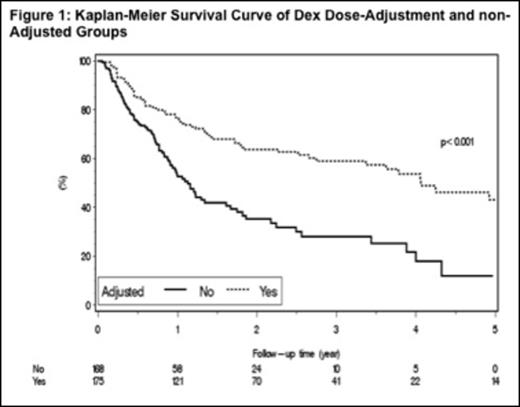Abstract
Background: Dexamethasone (dex) is an integral part of various anti-myeloma regimens both in the frontline and relapsed/refractory (RR) setting. Several clinical trials have shown that dex adds to the efficacy of novel therapeutic agents for multiple myeloma (MM). Yet, a substantial number of patients are intolerant to even the standard of care low-dose dex (40 mg weekly), especially in heavily pre-treated RRMM, possibly due to cumulative steroid toxicities and thus, require dex dose adjustments. There is a concern of compromising the efficacy of anti-MM regimens by adjusting the dex dose lower. We describe the frequency of dex dose adjustment, characteristics of patients who required it and its effect on patient outcomes in a large prospective clinical trial of pomalidomide (pom) and dex in RRMM (MC0789).
Methods: We utilized data from the Pom-dex trial (MC0789), which treated RRMM patients in different cohorts of pom (2 vs. 4 mg; 21 vs 28 days cycle) with fixed dose dex (40 mg orally weekly). Patients were divided into 2 subgroups, with any dose adjustment/elimination of dex vs. not. Continuous and categorical variables were compared between the two groups using two-sample t-test/Wilcoxon rank sum test or Chi-squared test, respectively. Logistic regression and Cox regression models were used to find the univariate and stepwise multivariate predictors of response to treatment and overall mortality, respectively. Kaplan-Meier method was used to estimate overall survival (OS) at 1, 3, and 5 years. All statistical tests were two-sided with the alpha level set at 0.05 for statistical significance.
Results: Results from the MC0789 clinical trial have been reported previously. Almost half of all treated patients in this trial had dex dose adjusted (n=175/343; 51%). The median number of cycles for the first dose adjustment in this group was 3 (range 1-62), with 46.5% of patients (n=82) having multiple dose adjustments and majority (58.3%, n=102) within the first 3 cycles of treatment. Patients in the dose adjustment group were significantly older (mean 65 vs 60 years; p=0.0001). Males, Whites and patients diagnosed before 2006 or with normal cytogenetics also had a higher incidence of dex dose adjustment, though this was not statistically significant. Patients with dex dose adjustment had a longer duration of treatment (mean 339 days) as compared to the non-adjusted cohort (mean 123.65 days) (95% CI 160.13, 270.58; p <0.0001). Dex dose adjustment was associated with a higher probability of responding in the clinical trial after a univariate (p<0.001) as well as multivariate (p<0.001) analysis. Patients with dex dose adjustment also had a significantly better OS at 1, 3 and 5 years by univariate (p<0.001) and multivariate (p<0.001) analysis. (Figure 1) The only other significant factor was lesser number of prior regimens (3 or less), associated with a higher probability of response (p=0.002) and survival (p<0.001).
Conclusion: Our analysis established that in these heavily pre-treated RRMM patients, appropriate dose adjustment of dex did not compromise their response rates; patients remained on treatment significantly longer and had an improved survival. Majority of patients (58.3%) requiring dex dose adjustment had it instituted early during treatment (<3 cycles), suggesting that early disease progression was less likely to determine dex dose continuation or adjustment. Appropriate dex adjustments should be judiciously employed as they may ensure longer treatment duration with novel anti-MM therapeutic agents, conferring superior response and survival in this difficult to treat MM subgroup. This also paves the path to further optimize dex dose in various anti-MM regimens, especially in these patients who are more likely to be intolerant to it.
Kumar:Skyline, Noxxon: Honoraria; Celgene, Millennium, Onyx, Janssen, Noxxon, Sanofi, BMS, Skyline: Consultancy; Celgene, Millennium, Onyx, Novartis, Janssen, Sanofi: Research Funding.
Author notes
Asterisk with author names denotes non-ASH members.


This feature is available to Subscribers Only
Sign In or Create an Account Close Modal